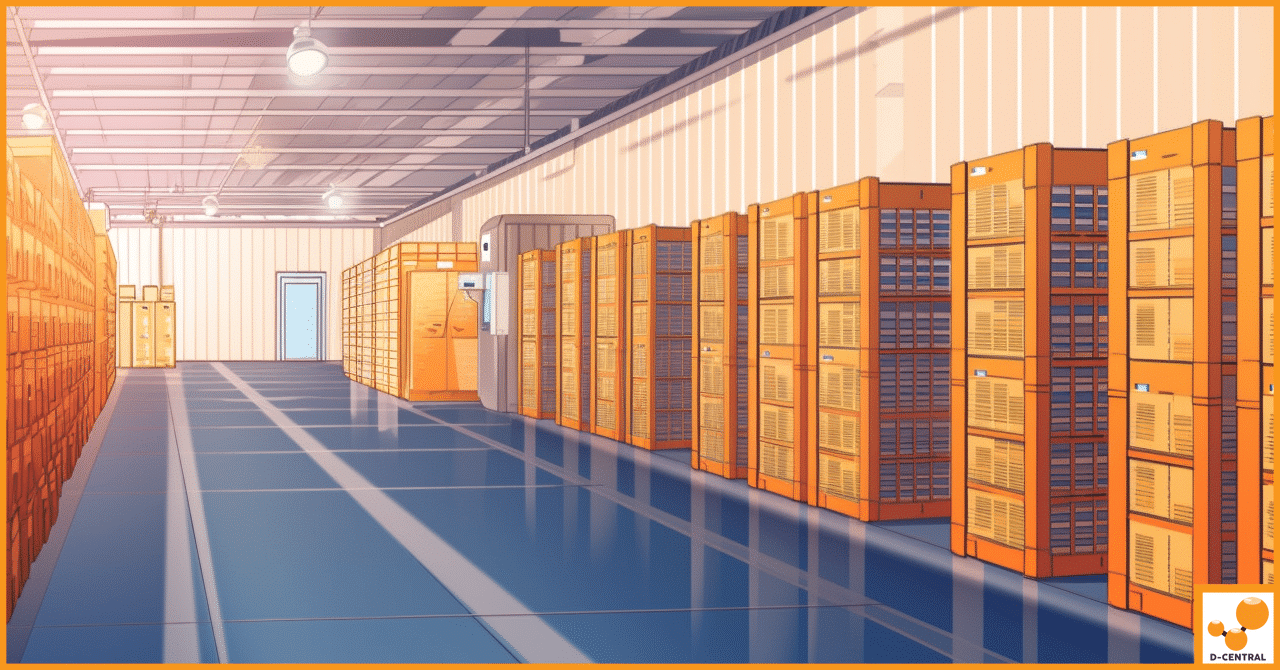
Avoiding the Bitcoin Mining General Data Center Trap
In the dynamic world of cryptocurrencies, Bitcoin stands as a towering figure, a digital gold rush drawing in a diverse
4479 Desserte Nord Autoroute 440, Laval, QC H7P 6E2

Integrating Bitcoin mining operations into food storage warehouses is an innovative approach that offers multiple benefits. By harnessing the excess heat generated by Bitcoin miners, these facilities can significantly reduce their heating costs and carbon footprint while making food more affordable for local communities. In addition, this solution supports the growth of the world’s strongest monetary network and demonstrates the power of interdisciplinary thinking and collaboration.
Bitcoin mining is the process by which new bitcoins are created and recorded in a public ledger known as the blockchain. In order to create new bitcoins, miners must solve complex mathematical problems using powerful computers. This process uses a significant amount of electricity, and as a result, generates a great deal of heat energy. This excess heat can be utilized in food storage warehouses to maintain the required temperature within the facility and reduce their energy costs.
Using Bitcoin mining operations in these facilities not only saves on heating costs but also has environmental benefits. The reduction in traditional heating methods, such as natural gas or electricity from fossil fuel-powered plants, lowers the carbon footprint associated with food storage warehouses. Furthermore, this approach creates job opportunities for skilled workers who are needed to operate and maintain the mining equipment.
In addition to its practical applications, Bitcoin mining operations integrated into food storage warehouses can also contribute to the strength and stability of the world’s strongest monetary network. By feeding more hash power into the Bitcoin network, these facilities help ensure that it remains secure and reliable for years to come.
Overall, integrating Bitcoin mining operations into food storage warehouses is an innovative solution for reducing heating costs and supporting sustainability efforts. It demonstrates how interdisciplinary thinking and collaboration can provide a sustainable solution that benefits both cryptocurrency miners and food storage warehouse owners alike.
The integration of Bitcoin mining operations into food storage warehouses offers numerous benefits for both the cryptocurrency and food storage industries. By utilizing the excess heat generated by Bitcoin miners, these facilities can significantly reduce their heating costs. This cost savings then translates to greater affordability for local communities that rely on these warehouses for fresh produce and other staples. Additionally, because the heat is generated from renewable energy sources like solar and wind, it helps to lower the carbon footprint associated with traditional heating methods.
Furthermore, this approach also creates job opportunities for skilled workers who are needed to operate and maintain the mining equipment. These workers are essential in helping ensure that Bitcoin miners remain secure and reliable, further strengthening the world’s strongest monetary network.
Not only does this innovative solution benefit both cryptocurrency miners and food storage warehouse owners, but it also supports sustainability efforts across the globe. By using a renewable energy source to power their heating systems, these warehouses are playing an important role in reducing greenhouse gas emissions and combatting climate change. Additionally, the reduction in fossil fuel consumption also helps to protect air quality in local communities by reducing smog and other pollutants caused by burning fuels like natural gas or coal.
Overall, integrating Bitcoin mining operations into food storage warehouses is an example of how interdisciplinary collaboration can provide a sustainable solution that benefits both industries involved. By utilizing the excess heat from Bitcoin miners, these facilities can reduce their heating costs while simultaneously contributing to global sustainability efforts.
The integration of Bitcoin miners into food storage warehouses is an innovative solution for reducing carbon emissions and supporting sustainability efforts. By utilizing the excess heat generated by Bitcoin miners, these facilities can significantly reduce their heating costs, which in turn reduces their reliance on traditional energy sources like natural gas or electricity from fossil fuel-powered plants. This helps to lower the associated carbon footprint, as burning of these fuels often generates significant amounts of greenhouse gases that contribute to climate change.
In addition to its environmental benefits, this approach also creates job opportunities for skilled workers who are needed to operate and maintain the mining equipment. These workers are essential in helping ensure that Bitcoin miners remain secure and reliable, further strengthening the world’s strongest monetary network.
Furthermore, using renewable energy sources like solar and wind to power the heating systems in food storage warehouses not only helps to reduce emissions but also improves air quality in local communities. The reduction in fossil fuel consumption helps to minimize smog and other pollutants caused by burning these fuels.
Overall, integrating Bitcoin mining operations into food storage warehouses is an effective way of reducing carbon emissions while simultaneously providing economic benefits for those involved. By utilizing renewable energy sources and leveraging the excess heat generated by Bitcoin miners, these facilities can reduce their heating costs while contributing positively towards global sustainability efforts.
Bitcoin mining operations are an essential part of the world’s strongest monetary network. These operations require large amounts of computing power and energy to secure transactions and keep the system running efficiently. By utilizing the excess heat generated by Bitcoin miners, food storage warehouses can be a key component in supporting this strong network.
Integrating Bitcoin miners into these facilities offers a number of economic benefits as well, since it reduces their reliance on traditional energy sources like natural gas or electricity from fossil fuel-powered plants. This helps to reduce operating costs while providing increased stability for local communities that rely on these warehouses for fresh produce and other staples.
The presence of skilled workers is also essential for ensuring that the Bitcoin miners remain reliable and secure. These workers operate and maintain the machines, ensuring they can remain productive and run efficiently over time. By having access to these workers, food storage warehouses are able to better support the world’s strongest monetary network, strengthening its reliability and making it more resilient against outside attacks or disruption.
Finally, integrating Bitcoin miners into food storage warehouses also provides environmental benefits by reducing greenhouse gas emissions associated with traditional heating methods. Renewable energy sources like solar and wind are used to power these systems, thus reducing the burning of fossil fuels like natural gas or coal which generate significant amounts of smog and other pollutants in local communities.
Overall, integrating Bitcoin miners into food storage warehouses is an effective way to support one of the world’s strongest monetary networks while simultaneously reducing carbon emissions and improving air quality in local environments. Through innovative solutions like this one, both cryptocurrency miners and food storage warehouse owners can benefit economically while simultaneously promoting sustainability efforts across the globe.
This example of interdisciplinary thinking and collaboration between the world of cryptocurrency mining and food storage warehouses demonstrates how powerful partnerships can be in driving sustainability efforts forward. By leveraging technological advances such as Bitcoin miners, we are able to reduce our reliance on traditional energy sources while also creating economic opportunities for those involved. Furthermore, this approach helps to minimize smog and other pollutants caused by burning fossil fuels which is beneficial for local communities. Ultimately, through innovative solutions like these, both businesses and individuals alike can benefit economically while simultaneously promoting global sustainability initiatives.
What is the benefit of integrating Bitcoin mining operations into food storage warehouses?
Integrating Bitcoin mining operations into food storage warehouses has multiple benefits. It allows for the utilization of the excess heat generated by miners, reducing heating costs for the warehouses. This cost savings can then be passed on to local communities, making food more affordable. Additionally, this solution supports sustainability efforts by reducing the carbon footprint associated with traditional heating methods.
How can integrating Bitcoin mining operations support the growth of the Bitcoin network?
By feeding more hash power into the Bitcoin network, integrating Bitcoin mining operations into food storage warehouses helps ensure the strength and reliability of the network. This supports the growth and stability of the world’s strongest monetary network.
What job opportunities are created by integrating Bitcoin mining operations?
Integrating Bitcoin mining operations into food storage warehouses creates job opportunities for skilled workers who are needed to operate and maintain the mining equipment. These workers play an essential role in ensuring the security and reliability of the Bitcoin miners.
What are the environmental benefits of integrating Bitcoin mining operations?
Integrating Bitcoin mining operations into food storage warehouses helps to reduce the carbon footprint associated with traditional heating methods. By utilizing renewable energy sources like solar and wind to power the heating systems, greenhouse gas emissions are minimized. This approach also improves air quality in local communities by reducing the burning of fossil fuels and the associated pollutants.
DISCLAIMER: D-Central Technologies and its associated content, including this blog, do not serve as financial advisors or official investment advisors. The insights and opinions shared here or by any guests featured in our content are provided purely for informational and educational purposes. Such communications should not be interpreted as financial, investment, legal, tax, or any form of specific advice. We are committed to advancing the knowledge and understanding of Bitcoin and its potential impact on society. However, we urge our community to proceed with caution and informed judgment in all related endeavors.
Related Posts

In the dynamic world of cryptocurrencies, Bitcoin stands as a towering figure, a digital gold rush drawing in a diverse

In the dynamic world of Bitcoin mining, the choice of a managed hosting provider is a pivotal decision that can

In the rapidly evolving world of cryptocurrency, choosing the right mining hardware can significantly impact your success. This comprehensive guide